Have you ever witnessed your feline friend taking a tumble while doing their business? Although it may seem amusing at first, this behavior can actually be indicative of a more serious underlying health problem. As a responsible cat owner, it’s crucial to understand why your cat falls over when pooping and what steps you can take to help them.
Firstly, cats are notoriously private creatures who prefer to do their business in a calm and comfortable environment. The position they choose during defecation could be the culprit behind their balance issues. For instance, if your cat is squatting too low or too high, they may lose their footing and topple over. However, if this behavior persists, it could signal an underlying health issue.
Secondly, medical conditions such as arthritis, neurological problems, and dehydration can all cause balance problems in cats while defecating. These ailments can affect your cat’s motor skills and make it challenging for them to maintain equilibrium.
It’s clear that there are numerous potential reasons for your kitty’s falling-over predicament. Consequently, if you observe this behavior in your cat frequently, we recommend seeking veterinary advice promptly. Remember that you’re responsible for your furry friend’s well-being and any sign of discomfort should not be ignored.
In summary, keep an eye on your cat’s bathroom habits and don’t hesitate to contact a veterinarian if you have any concerns about their health or behavior.
What is Sensory Ataxia?
You may be surprised to learn that this behavior could be a telltale sign of Sensory Ataxia – a condition that affects a cat’s ability to coordinate their movements and balance.
Sensory Ataxia is caused by a problem in the sensory nerves responsible for transmitting information about the position and movement of body parts to the brain. This type of ataxia can be triggered by various underlying medical conditions such as diabetes, hypothyroidism, or kidney disease.
In cats, Sensory Ataxia can manifest as difficulty controlling their hind legs, leading to instability and falls while attempting to defecate. Other symptoms may include uncoordinated movements, difficulty walking, and muscle weakness. It’s crucial to remember that Sensory Ataxia is not a disease itself but rather a symptom of an underlying condition.
While medical conditions can contribute to Sensory Ataxia, environmental factors can also play a role. An unstable litter box placement or poor lighting and excessive noise in the area can make your cat feel uneasy and unbalanced.
If you suspect that your cat may have Sensory Ataxia or any other medical condition, it’s essential to take them to the veterinarian for a proper diagnosis and treatment. Depending on the underlying cause, treatment may involve medications or changes in your cat’s diet and lifestyle.
Causes of Sensory Ataxia in Cats
It could be due to Sensory Ataxia, a neurological condition that affects the body’s sense of position and movement. But what causes this condition?
One of the most common reasons is trauma to the spinal cord, which can occur due to accidents or falls. This can lead to damage in the nervous system that controls proprioception. Additionally, diseases like multiple sclerosis and diabetes can also damage the nervous system and result in sensory ataxia.
However, external factors are not the only culprits. Certain medications or toxins can also cause nerve damage and lead to balance issues in cats. For instance, prolonged use of antibiotics can be a contributing factor.
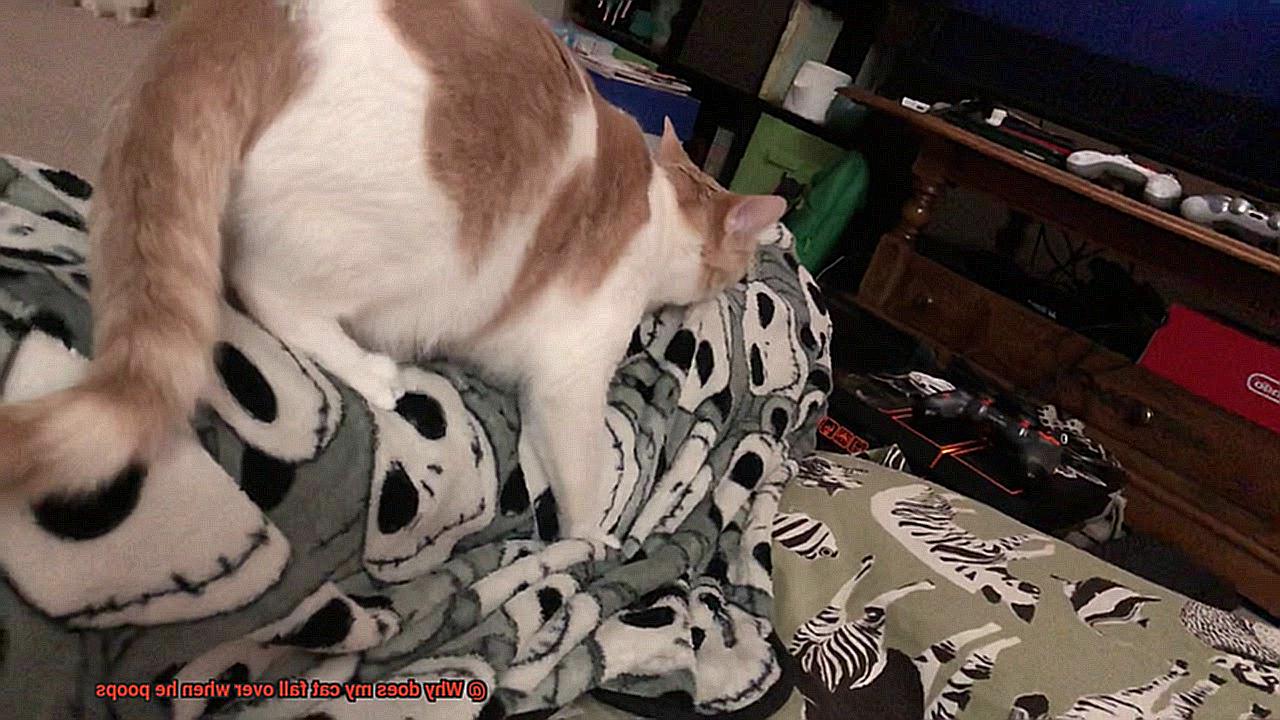
Age can also play a role in developing sensory ataxia. As cats age, their nervous system may deteriorate, leading to balance issues and other neurological problems. But it’s essential to remember that sensory ataxia is not always the reason behind a cat falling over when they poop. Other conditions such as arthritis or muscle weakness may also contribute to this behavior.
Age-Related Issues and Falling Over While Pooping
As our feline friends age, they can become susceptible to various health issues that affect their balance, coordination, and mobility. Unfortunately, this can sometimes lead to them toppling over while trying to do their business in the litter box. In this post, we’ll explore the age-related issues that can cause cats to fall over while pooping and how we can address them.
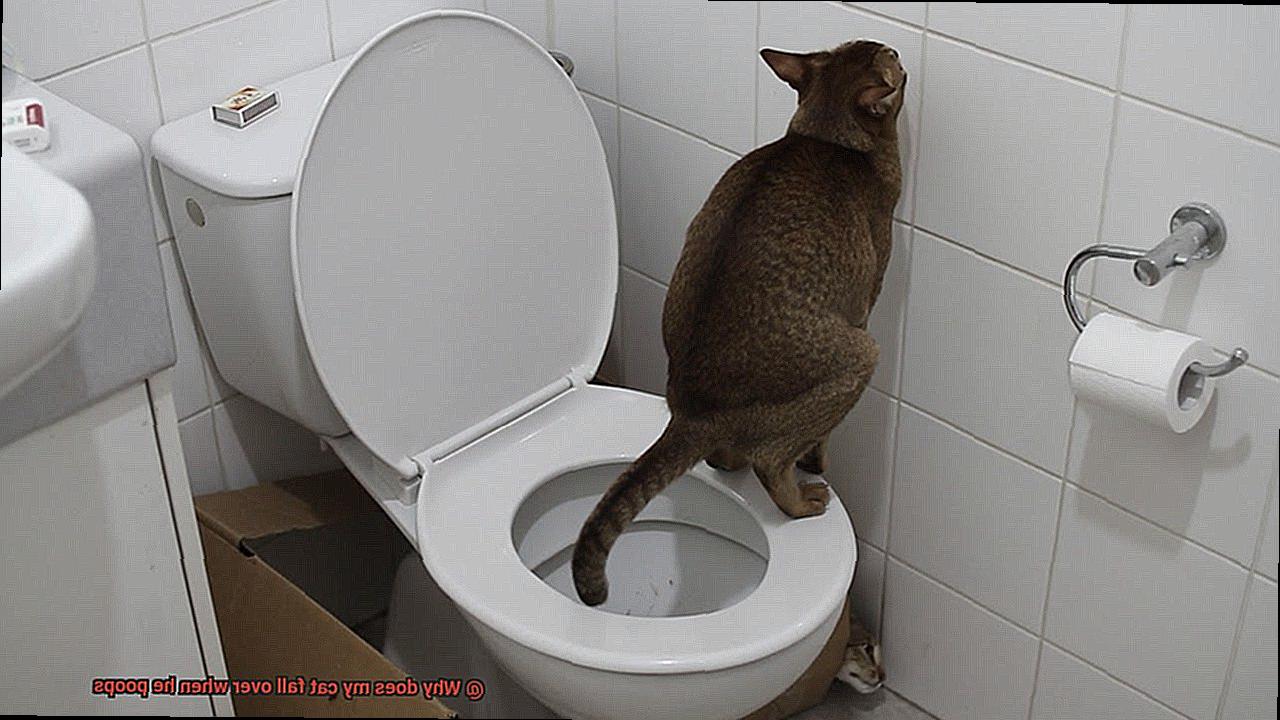
Arthritis is a common problem that affects older cats and can cause pain and stiffness. This discomfort makes it challenging for your cat to squat comfortably when using the litter box, leading to falls. Other age-related issues such as neurological problems and cognitive decline can also affect your cat’s balance and coordination.
If you notice changes in your cat’s behavior, like loss of appetite, lethargy, or difficulty with mobility, it’s essential to take them to the vet for a proper diagnosis and treatment plan. Early intervention gives you a better chance of minimizing the impact of these issues on your cat’s quality of life.
To help your aging feline friend poop comfortably, there are several things you can do. Providing a litter box with lower sides makes it easier for them to climb in and out, while adding a step or ramp helps those with mobility issues. Additionally, placing a soft bed or cushion near the litter box provides extra support and comfort.
Environmental Factors that Contribute to Falling Over While Pooping
So, when you notice your feline falling over while pooping, it’s a sign that you need to consider the environmental factors at play.
One of the significant environmental factors that contribute to cats falling over while pooping is the litter box itself. If the litter box is too small or not deep enough, your cat may find it difficult to maintain its balance while using the box. Moreover, if the litter isn’t cleaned frequently enough or is too shallow, your cat may not find a stable footing. Therefore, it’s essential to choose a litter box that’s large and deep enough with clean and adequate litter.
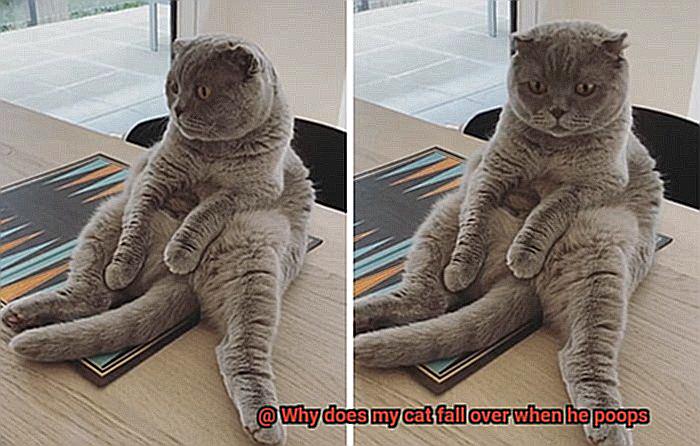
Another factor to consider is the location of the litter box. If the litter box is situated in an area with a lot of foot traffic or noise, your cat may become startled or distracted while using the box, leading to a loss of balance. In contrast, placing the litter box in a quiet and secluded area can help reduce these distractions and provide a peaceful environment for your cat.
Older cats or those with mobility issues require special attention to maintain balance while using the litter box. You can consider adding low steps or ramps leading up to the box or providing a larger and more stable litter box. These adjustments will go a long way in ensuring that your feline friend feels comfortable and safe.
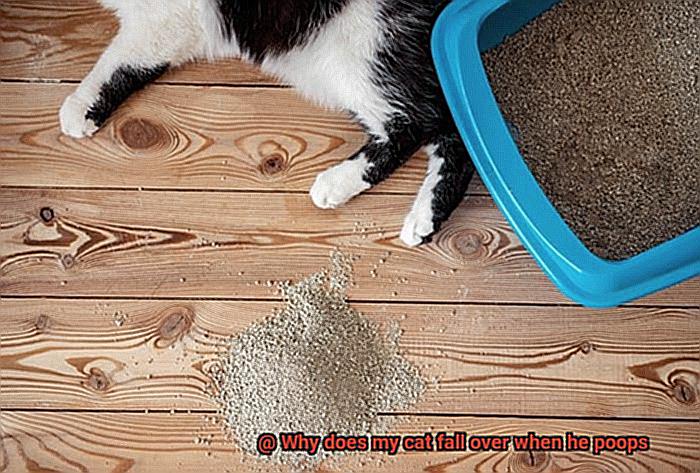
How to Help a Cat with Sensory Ataxia or Muscle Weakness
As a cat owner, it’s important to understand the conditions that can cause your furry friend to fall over when using the litter box. Sensory ataxia and muscle weakness are two common conditions that affect a cat’s balance and coordination. Sensory ataxia is caused by nerve damage, while muscle weakness can result from age-related muscle loss or a lack of exercise. Knowing the causes of these conditions can help you provide the right care for your cat.
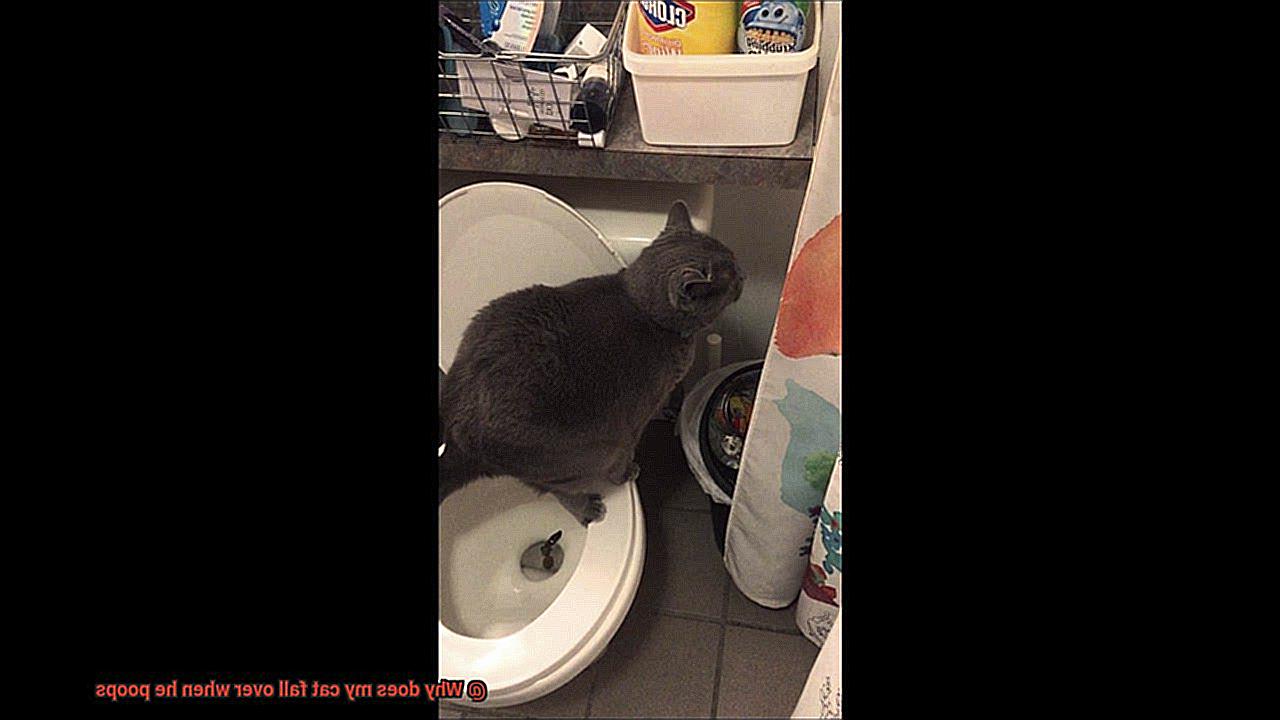
Seeking Veterinary Care
If you suspect that your cat is experiencing sensory ataxia or muscle weakness, don’t hesitate to take them to the vet. An accurate diagnosis and treatment plan are crucial for managing your cat’s symptoms effectively. Your vet may recommend physical therapy, medication, or other supportive care to improve your cat’s quality of life.

Making Litter Box Modifications
To make it easier for your cat to use the litter box, consider making some modifications to the box itself. A litter box with lower sides allows your cat to step in and out of the box more easily. If your cat needs more support, a litter box with high sides and a ramp can provide extra stability. Additionally, placing the litter box in a quiet and easily accessible location can reduce stress and make it simpler for your cat to get to the box.
Regular Exercise and Playtime
Regular exercise and playtime are essential for maintaining your cat’s overall physical health, especially if they have sensory ataxia or muscle weakness. Encourage your cat to play with toys or engage in other forms of physical activity every day. This helps strengthen their muscles and improve their coordination and balance, reducing falls and improving their overall health.
Patience and Support
Caring for a cat with sensory ataxia or muscle weakness can be challenging, but it’s essential to remain patient and supportive. These conditions can be frustrating and scary for your cat, so offer plenty of encouragement, praise, and comfort as they navigate their condition. With the right care and support, your cat can still lead a happy and fulfilling life, even with sensory ataxia or muscle weakness.
Tips for Preventing Falls While Using the Litter Box
As a cat owner, you want to make sure that your furry friend is safe and comfortable during their daily bathroom routine. But did you know that a fall while using the litter box can be dangerous for your cat? Here are five tips to help prevent falls and ensure that your cat stays happy and healthy:
Choose the Right Type of Litter Box
While high-sided litter boxes may seem like a good idea to prevent litter spillage, they can be challenging for older or less mobile cats to climb in and out of. Consider getting a box with lower sides or a ramp to make it easier for your cat to access their litter box without risking a fall.
Keep the Litter Box Clean
Regular scooping and cleaning of the litter box not only help prevent unpleasant odors but also help prevent falls. A dirty or overcrowded litter box can be difficult for your cat to navigate, increasing the risk of slipping or falling.
Provide a Stable Surface
A non-slip mat or carpet square placed underneath the litter box can provide extra traction and stability for your cat, preventing the box from sliding around during use.
Keep the Litter Box Accessible
It’s essential to place the litter box in an easily accessible area free from clutter or obstacles that could cause your cat to trip or fall. Additionally, if you have multiple cats, provide enough litter boxes to avoid competition and potential accidents.
Consider Alternative Surfaces: If your cat is experiencing difficulty using their traditional litter box, it may be time to consider an alternative surface, such as a low-sided tray or cardboard box. This can help reduce the risk of falls and provide your cat with an additional option for elimination.
By following these tips, you can help ensure that your cat stays safe and comfortable while using the litter box. Remember, falling while pooping is not normal behavior for cats, and if your cat is experiencing this issue, it’s important to consult with a veterinarian to identify any underlying medical conditions that may be contributing to the problem.
35RQ3wuxIg0″ >
Conclusion
To sum up, if you’ve ever seen your cat fall over while doing their business, it’s important to understand that this could be a sign of an underlying health issue. There are various reasons why cats may topple over when pooping, such as environmental factors, age-related problems, or medical conditions like sensory ataxia and muscle weakness. Seeking veterinary advice promptly is crucial.
As a responsible cat owner, there are several things you can do to help prevent falls in the litter box. Choosing the right type of litter box and keeping it clean and accessible is key. Providing stable surfaces like non-slip mats or carpets can also be helpful. Regular exercise and playtime are essential for maintaining your cat’s overall physical health.
Remember that sensory ataxia isn’t a disease itself but rather a symptom of an underlying condition. Getting veterinary care is critical for managing your cat’s symptoms effectively. With patience and support, your cat can still lead a happy life even with sensory ataxia or muscle weakness.
In short, keep an eye on your feline friend’s bathroom habits and make any necessary adjustments to ensure their safety and comfort while using the litter box. Don’t hesitate to contact a veterinarian if you have any concerns about their health or behavior.







